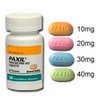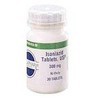 | Remeron (Miron) Active Ingredient: Mirtazapine Remeron is used for treating depression. Other names for this medication: Afloyan, Amirel, Avanza, Axit, Beron, Calixta, Ciblex, Combar, Divaril, Esprital, Mepirzapine, Mepirzepine, Merdaten, Miramerck, Mirap, Miro, Miron, Mirrador, Mirt, Mirtabene, Mirtadepi, Mirtagamma, Mirtalich, Mirtapax, Mirtapel, Mirtaril, Mirtaron, Mirtastad, Mirtawin, Mirtaz, Mirtazapina, Mirtazapinum, Mirtazelon, Mirtazep, Mirtazepine, Mirtazon, Mirtel, Mirtin, Mirzalux, Mirzaten, Mitrazin, Miva, Mizapin, Nassa, Norset, Noxibel, Promyrtil, Remergil, Remergon, Remirta, Rexer, Tazamel, Tazepin, Valdren, Vastat, Zapex, Zismirt, Zispin, Zuleptan Show all |
INDICATIONS
Remeron is used for treating depression. Remeron is a tetracyclic antidepressant. It is thought to increase the activity of certain chemicals in the brain (norepinephrine, serotonin), which help elevate mood.
INSTRUCTIONS
Use Remeron as directed by your doctor.
- Take Remeron by mouth with or without food.
- Take Remeron in the evening before bedtime unless your doctor tells you otherwise.
- Improvement should be noticed within 1 to 4 weeks of taking Remeron.
- Continue to take Remeron even if you feel well. Do not miss any dose.
- If you miss a dose of Remeron, take it as soon as possible. If it is almost time for your next dose, skip the missed dose and go back to your regular dosing schedule. Do not take 2 doses at once.
Ask your health care provider any questions you may have about how to use Remeron.
STORAGE
Store Remeron at room temperature, between 68 and 77 degrees F (20 and 25 degrees C). Store away from heat, moisture, and light. Do not store in the bathroom. Keep Remeron out of the reach of children and away from pets.
MORE INFO:
Active Ingredient: Mirtazapine.
Do NOT use Remeron if:
- you are allergic to any ingredient in Remeron
- you are taking furazolidone
- you are taking or have taken a monoamine oxidase inhibitor (MAOI) (eg, phenelzine) within the last 14 days.
Contact your doctor or health care provider right away if any of these apply to you.
Some medical conditions may interact with Remeron. Tell your doctor or pharmacist if you have any medical conditions, especially if any of the following apply to you:
- if you are pregnant, planning to become pregnant, or are breast-feeding
- if you are taking any prescription or nonprescription medicine, herbal preparation, or dietary supplement
- if you have allergies to medicines, foods, or other substances
- if you have liver or kidney disease or a low white blood cell count, or have attempted or thought about suicide.
Some medicines may interact with Remeron. Tell your health care provider if you are taking any other medicines, especially any of the following:
- Hydantoins (eg, phenytoin) because they may decrease Remeron's effectiveness
- Fluvoxamine, furazolidone, or MAOIs (eg, phenelzine) because side effects, such as nausea, dizziness, or seizures, may occur
- Fluvoxamine because it may increase the risk of Remeron's side effects
- Clonidine because it may decrease Remeron's effectiveness.
This may not be a complete list of all interactions that may occur. Ask your health care provider if Remeron may interact with other medicines that you take. Check with your health care provider before you start, stop, or change the dose of any medicine.
Important safety information:
- Remeron may cause drowsiness or dizziness. These effects may be worse if you take it with alcohol or certain medicines. Use Remeron with caution. Do not drive or perform other possible unsafe tasks until you know how you react to it.
- Children, teenagers, and young adults who take Remeron may be at increased risk for suicidal thoughts or actions. Watch all patients who take Remeron closely. Contact the doctor at once if new, worsened, or sudden symptoms such as depressed mood; anxious, restless, or irritable behavior; panic attacks; or any unusual change in mood or behavior occur. Contact the doctor right away if any signs of suicidal thoughts or actions occur.
- Lab tests, including liver function, kidney function, and complete blood cell counts, may be performed while you use Remeron. These tests may be used to monitor your condition or check for side effects. Be sure to keep all doctor and lab appointments.
- Remeron should not be used in children; safety and effectiveness in children have not been confirmed.
- Pregnancy and breast-feeding: If you become pregnant, contact your doctor. You will need to discuss the benefits and risks of using Remeron while you are pregnant. It is not known if Remeron is found in breast milk. If you are or will be breast-feeding while you use Remeron, check with your doctor. Discuss any possible risks to your baby.
All medicines may cause side effects, but many people have no, or minor, side effects.
Check with your doctor if any of these most common side effects persist or become bothersome:
Abnormal dreams; abnormal thinking; constipation; dizziness; drowsiness; dry mouth; flu symptoms; increased appetite; weakness; weight gain.
Seek medical attention right away if any of these severe side effects occur:
Severe allergic reactions (rash; hives; itching; difficulty breathing; tightness in the chest; swelling of the mouth, face, lips, or tongue); decreased ability to fight infection (fever, chills, sore throat); mental or mood changes; mouth sores; thoughts of hurting yourself; tremors; worsening of depression.
This is not a complete list of all side effects that may occur. If you have questions about side effects, contact your health care provider.
 RemeronRemeron is used for treating depression.as low as $1.14
RemeronRemeron is used for treating depression.as low as $1.14 LithiumLithium Carbonate is indicated for the treatment of manic episodes of manic-depressive illness.as low as $0.44
LithiumLithium Carbonate is indicated for the treatment of manic episodes of manic-depressive illness.as low as $0.44 WellbutrinWellbutrin (bupropion) is an antidepressant medication. It works in the brain to treat depression.as low as $1.96
WellbutrinWellbutrin (bupropion) is an antidepressant medication. It works in the brain to treat depression.as low as $1.96 SinequanSinequan is used for treating depression or anxiety in certain patients.as low as $0.3
SinequanSinequan is used for treating depression or anxiety in certain patients.as low as $0.3 PaxilPaxil is used for treating depression or obsessive-compulsive disorder (OCD).as low as $0.68
PaxilPaxil is used for treating depression or obsessive-compulsive disorder (OCD).as low as $0.68 IsoniazidIsoniazid is used for treating or preventing tuberculosis.as low as $0.43
IsoniazidIsoniazid is used for treating or preventing tuberculosis.as low as $0.43